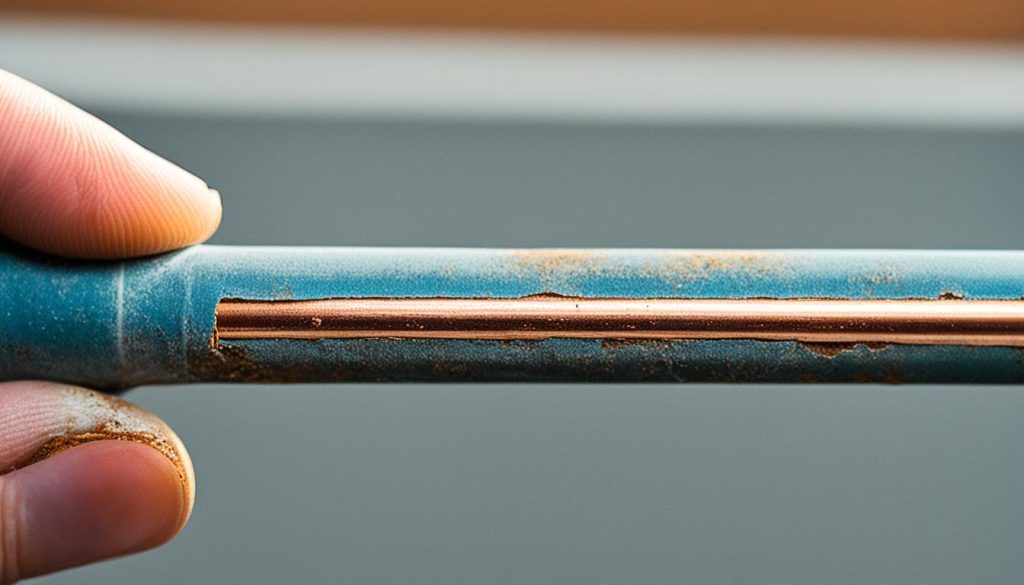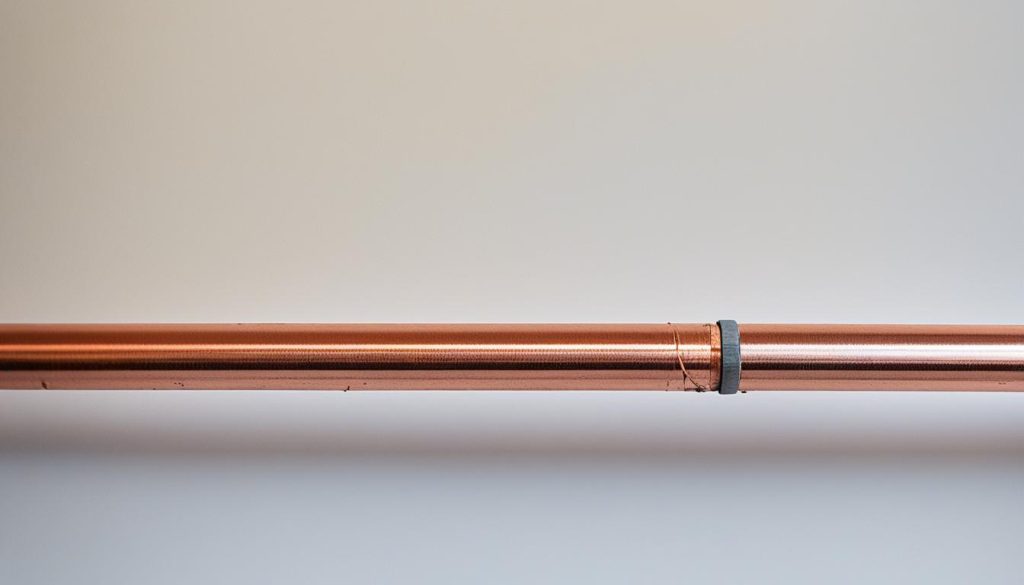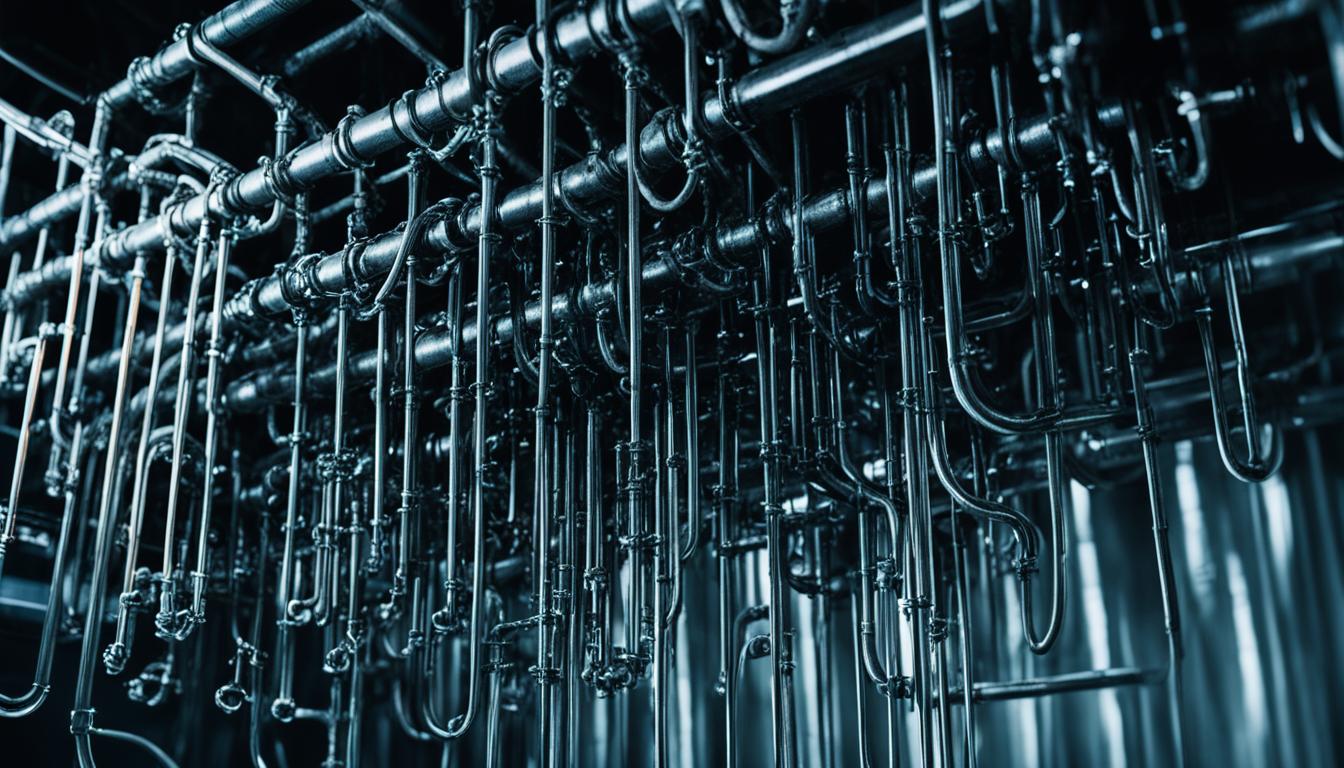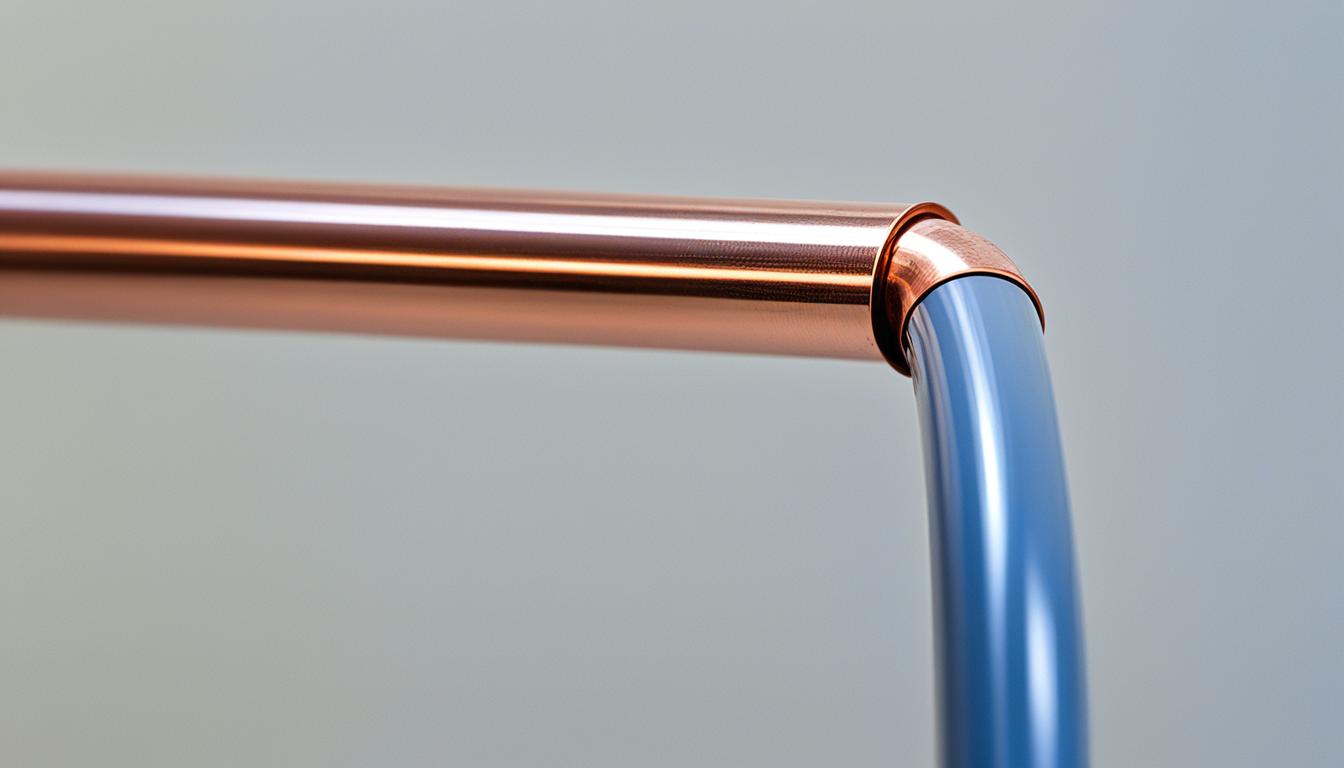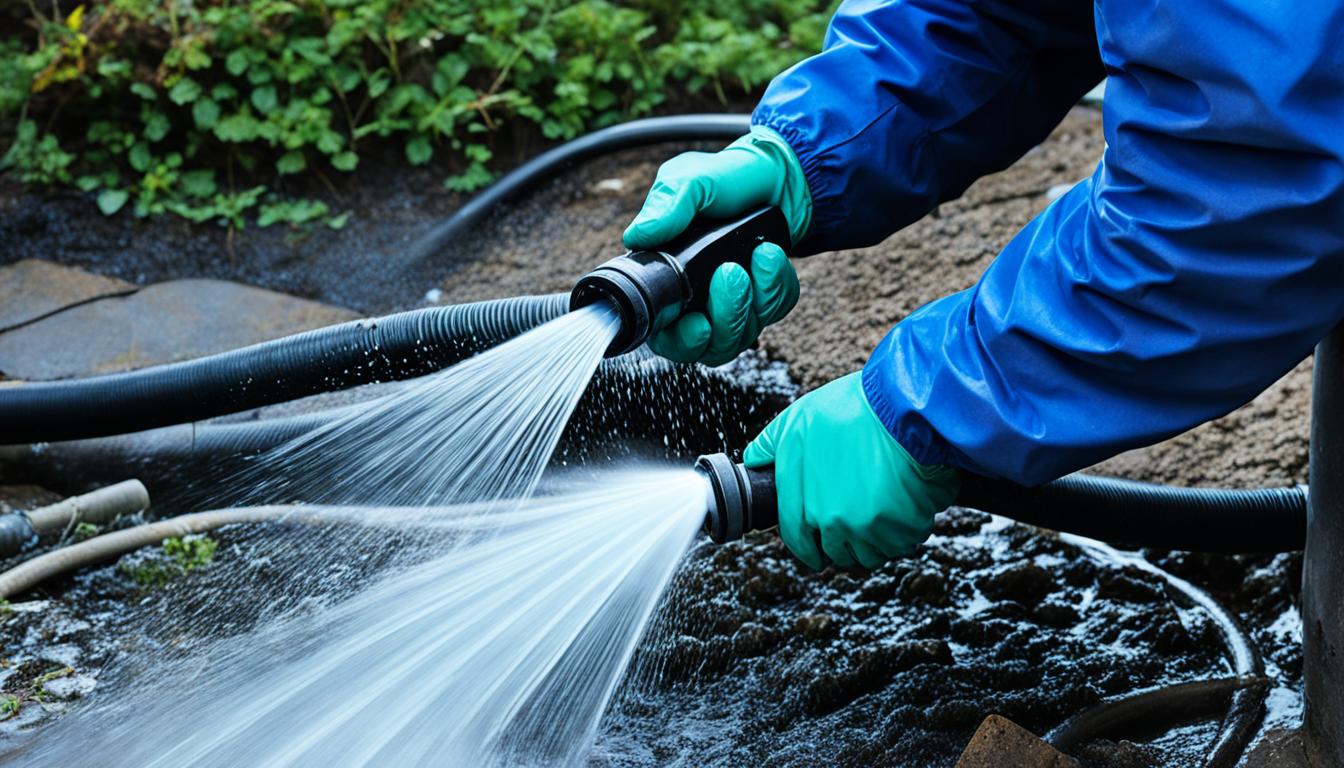Lifespan of Copper Water Pipes Revealed
Did you know that the lifespan of copper water pipes can range from a few decades to over a century? It’s true! The longevity of copper pipes depends on various factors such as the type and thickness of the pipes.
When it comes to durability and corrosion resistance, L-type copper pipes are the top choice for residential plumbing. On average, these pipes can last at least 50 years and even surpass the 100-year mark in some cases. In contrast, M-type copper pipes, with their thinner walls, may only last around 20 years due to increased susceptibility to corrosion. While K-type copper pipes are the most durable, they are typically used in non-residential applications.
If you’re a homeowner looking for a cost-effective and long-lasting option, L-type copper pipes are the way to go. Their excellent durability and corrosion resistance make them a reliable choice for your plumbing needs.
Key Takeaways:
- L-type copper pipes can last for 50 years or more, making them a durable option for residential plumbing.
- M-type copper pipes have a shorter lifespan of around 20 years due to their thin walls.
- K-type copper pipes are the most durable but are typically used for non-residential applications.
- Choosing L-type copper pipes provides excellent corrosion resistance and is a cost-effective option for homeowners.
Factors Affecting Copper Pipe Durability
When it comes to the longevity of copper plumbing, there are several factors that can influence the durability of copper pipes. Understanding these factors can help homeowners make informed decisions about their plumbing systems and take necessary steps to extend the lifespan of their copper pipes. In this section, we’ll explore the key factors that affect copper pipe durability and provide tips on how to ensure the longevity of your copper plumbing.
Water Quality and Corrosion Resistance
One of the main factors that can impact the lifespan of copper pipes is water quality, especially its acidity. Copper pipes are highly resistant to corrosion, but they can still be susceptible to damage when exposed to highly acidic water. Over time, the acidity can cause corrosion and weaken the pipes, leading to leaks and other plumbing issues.
To mitigate the effects of acidic water on copper plumbing, it’s important to consider water treatment options such as installing a water softener or using corrosion inhibitors. These measures can help maintain the pH balance of the water and protect the copper pipes from corrosion, ensuring their longevity.
Water Pressure and Structural Integrity
Another factor that can impact the durability of copper pipes is water pressure. High water pressure can cause stress on the pipes, leading to leaks and other structural issues. It’s important to ensure that the water pressure in your plumbing system is within the recommended range to prevent unnecessary strain on the copper pipes.
Electrical Connections and Galvanic Corrosion
Copper pipes can also be affected by electrical connections and contact with other metals. When copper pipes come into contact with dissimilar metals, such as steel or iron, it can result in a phenomenon known as galvanic corrosion. This can accelerate the corrosion process, leading to premature pipe failure.
Proper installation techniques, such as using dielectric unions to separate copper pipes from other metals, can help prevent galvanic corrosion and extend the lifespan of copper plumbing.
Maintenance and Regular Inspections
To ensure the longevity of copper pipes, regular maintenance and inspections are crucial. This includes checking for signs of corrosion, leaks, and any other issues that may compromise the integrity of the pipes. Prompt repairs and proactive maintenance can help address minor problems before they escalate, extending the lifespan of the copper plumbing system.
Additionally, performing routine cleaning and flushing of the plumbing system can help remove any build-up or sediment that may contribute to corrosion and reduce the efficiency of the pipes.
| Factors Affecting Copper Pipe Durability | Tips to Extend Copper Pipe Lifespan |
|---|---|
| Water Quality | Install water treatment options to maintain pH balance and protect against corrosion |
| Water Pressure | Maintain water pressure within recommended limits |
| Electrical Connections | Use dielectric unions to prevent galvanic corrosion |
| Contact with other metals | Prevent direct contact between copper pipes and dissimilar metals |
| Maintenance and Inspections | Regularly check for signs of corrosion and leaks, and perform routine cleaning and flushing |
Choosing the Right Type of Copper Pipe
When it comes to selecting the right type of copper pipe for your home, there are a few factors to consider. The expected lifespan and maintenance requirements play a crucial role in making an informed decision. For residential plumbing, L-type copper pipes are highly recommended due to their exceptional durability and resistance to corrosion. These pipes can last for several decades, minimizing the need for frequent replacements and ensuring long-term reliability.
In addition to choosing the right type of copper pipe, proper maintenance is crucial for maximizing its lifespan. Regular drain cleaning and leak checks should be a part of your maintenance routine to prevent potential issues and ensure optimal performance. By following these maintenance tips, you can extend the lifespan of your copper pipes and minimize the need for costly repairs or replacements.
Maintenance Tips for Copper Pipes:
- Regularly check for leaks or signs of corrosion
- Keep the pipes clean and free from debris
- Monitor water pressure to prevent excess strain on the pipes
- Consider installing a water treatment system if your water has high acidity
- Insulate the pipes to protect them from extreme temperatures
Professional Installation of Copper Pipes
When it comes to installing copper pipes for your plumbing system, hiring a licensed professional plumber is the best way to ensure a successful and efficient project. Installing copper pipes requires skill and expertise that only a trained professional can provide.
Professionals have the necessary knowledge to properly measure, cut, and join copper pipes using soldering techniques. They understand the intricacies of copper pipe installation and can ensure that the pipes are installed according to code requirements.
One of the key aspects of copper pipe installation is achieving the correct slope for drainage. Improper slope can lead to water accumulation and potential damage to your plumbing system. Licensed plumbers have the expertise to ensure that the slope is set correctly, preventing any drainage issues.
Attempting a DIY installation without prior plumbing experience can lead to a host of problems. Leaks, flooding, and costly repairs are just some of the potential issues that can arise from improper installation. By hiring a licensed professional plumber, you can avoid these unnecessary headaches and have peace of mind that the installation is done right the first time.
Moreover, professional plumbers stay updated with the latest industry practices and advancements. They have access to the proper tools and equipment needed for copper pipe installation. With their expertise and resources, they can complete the project efficiently and effectively.
Investing in a professional installation not only ensures the proper functioning of your plumbing system, but it also offers long-term benefits. Copper pipes are known for their durability and longevity. By having a licensed professional install your copper pipes, you can maximize the lifespan of your plumbing system and avoid costly repairs in the future.
In summary, hiring a licensed professional plumber for your copper pipe installation is a wise investment. Their expertise, knowledge, and experience will ensure that your plumbing system is installed correctly and will last for years to come.
Cost and Value of Copper Pipes
When considering plumbing materials for your home, it’s important to evaluate both the initial cost and the long-term value. Copper pipes, while pricier upfront compared to alternatives like PEX and PVC, offer significant advantages in terms of durability and longevity.
Copper pipes are renowned for their superior strength and resistance to corrosion, making them an excellent investment in the long run. Although the initial cost may be higher, their extended lifespan translates into cost savings over time due to reduced maintenance and replacement expenses.
Comparison of Copper Pipe Costs
To better understand the cost dynamics, let us compare the different types of copper pipes available and their associated installation costs.
| Copper Pipe Type | Approximate Cost (per linear foot) |
|---|---|
| L-Type Copper Pipe | $4 – $6 |
| M-Type Copper Pipe | $2 – $4 |
| K-Type Copper Pipe | $6 – $9 |
The Value of Copper Pipes
While the initial cost of copper pipes may seem higher, their many advantages contribute to their overall value. Copper pipes offer:
- Durability: With a potential lifespan of over 50 years, copper pipes are built to last.
- Corrosion resistance: Copper’s natural resistance to corrosion ensures a reliable and long-lasting plumbing system.
Moreover, installing copper pipes can even increase the resale value of your home. Prospective buyers often view copper plumbing as a desirable feature, as it demonstrates quality and adds peace of mind regarding potential water-related issues.
In summary, despite the initial higher cost, the durability, corrosion resistance, and increased home value make copper pipes a smart and cost-effective choice.
Comparison of Copper Pipes with Other Materials
Copper pipes have long been a popular choice for residential water pipes due to their exceptional durability and resistance to corrosion. When comparing copper pipes with other materials like PEX, CPVC, and galvanized steel pipes, copper emerges as the superior option in terms of longevity and reliability.
Copper vs PEX
PEX pipes, or cross-linked polyethylene pipes, have gained popularity in recent years due to their ease of installation and lower cost. However, when it comes to lifespan, copper pipes outperform PEX pipes. On average, properly installed copper pipes can last 50 to 70 years, whereas PEX pipes have a lifespan of 25 to 50 years.
Copper vs CPVC
CPVC, or chlorinated polyvinyl chloride, pipes are another alternative to copper pipes. While CPVC pipes offer good resistance to corrosion and are suitable for hot water applications, they are not as durable as copper pipes. Copper pipes have a longer lifespan and are less prone to cracks and leaks compared to CPVC pipes.
Copper vs Galvanized Steel Pipes
Galvanized steel pipes were commonly used in the past, but they have been largely replaced by copper pipes due to their susceptibility to rust and corrosion. Copper pipes provide a much longer service life and are not prone to the same issues that affect galvanized steel pipes.
Overall, copper pipes continue to be the gold standard for residential plumbing due to their unrivaled longevity and reliability. Investing in copper pipes ensures a long-lasting and worry-free plumbing system for your home.
Considerations for Copper Pipe Installation
When it comes to installing copper pipes in your home, there are several key considerations to keep in mind. First and foremost, you need to assess the water pressure in your area. Copper pipes are known for their ability to withstand high water pressure, making them an ideal choice for homes with fluctuating or elevated water pressure levels.
Another important factor to consider is the water chemistry. Different water sources can vary in terms of acidity, which can affect the lifespan of copper pipes. If your water has a high level of acidity, it can accelerate corrosion and reduce the longevity of copper pipes. It’s crucial to test your water chemistry and, if necessary, consult with a professional to implement water treatment solutions to minimize the risk of corrosion.
Furthermore, the installation of copper pipes can have a positive impact on the value of your home. Potential homebuyers often view copper piping as a desirable feature, as it indicates that important plumbing upgrades have been made. This can potentially increase the resale value of your home, ultimately providing a return on your investment.
Lastly, it’s essential to be aware of the signs of copper pipe failure. Reduced water pressure, leaks, discolored water, and the presence of corrosion are all indicators of potential issues with your copper pipes. Regular maintenance and inspections by a licensed plumber can help identify and address these issues before they escalate into costly and disruptive problems.
Source Links
- https://todayshomeowner.com/plumbing/guides/how-long-does-copper-pipe-last/
- https://www.balkanplumbing.com/how-long-do-copper-water-lines-last/
- https://whyrepipe.com/blog/copper-pipe-life-expectancy/
- Investing Wisely: How Windows & Doors in Boost Property Value and Financial Health - April 24, 2025
- The Financial Impact of Personal Injuries: Why Legal Help Matters for Business Owners - April 16, 2025
- The Hidden Financial Costs of Domestic Assault: What Business Owners Need to Know - April 16, 2025
